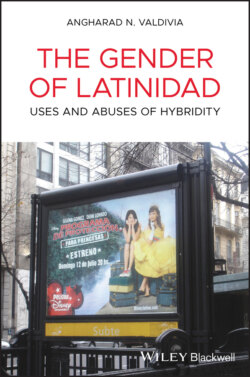The Gender of Latinidad

Реклама. ООО «ЛитРес», ИНН: 7719571260.
Оглавление
Angharad N. Valdivia. The Gender of Latinidad
Table of Contents
Guide
Pages
The Gender of Latinidad. Uses and Abuses of Hybridity
Acknowledgments
1 Continuities and Ruptures: The Gender of Latinidad
Notes
2 Spitfire Transition Tales: The Production of a Career
The Spitfire
Our Mediated Latina Spitfires
Rita Moreno
Rosie Perez
Charo
Salma Hayek
Sofía Vergara
Conclusion
Notes
3 An Unambivalent Structure of Ambivalence: Disney's Production of Latina Princesses. Preface: Disney Does Moana – Cultural Politics in 2016
Media ↔ Toys
Disney Tales
Latina/os and/in Disney
Disney Princesses
Latina Disney Princesses?
Ethnicizing Tween Dreams
Real‐Life Latinas: Selena Gomez and Demi Lovato
Ambiguous Latinas in an Ambiguous “Latin” Movie
Selena and Demi Grow Up
Sofia the First
Elena of Avalor
Conclusion
Notes
4 Latina/o Media Utopias: The Ideal Place or No Place
Utopia
Media Studies and Utopia
Disney, Utopia, and the American Dream
Latina/o Media Utopias
Utopia and Production
Award Shows as Embodiment of Utopia
Plus ça change…
Where To?
Academia
Acknowledgment
Notes
References
Index. a
b
c
d
e
f
g
h
i
j
k
l
m
n
o
p
q
r
s
t
u
v
w
x
y
WILEY END USER LICENSE AGREEMENT
Отрывок из книги
Angharad N. Valdivia
I dedicate this book to ICR Nation, present, past, and (hopefully) future.
.....
In the 2016 US presidential election, the Republican party, which for decades has courted a section of the electorate that retains whiteness as a premium, generated a successful candidate who combines tendencies to simultaneously racialize and criminalize with a reality television approach to decision making. A love of social media and Twitter rounds out his novel idea of national governance. This toxic mixture of media and narrative results in a rapidly evolving terrain of belonging, whose terms of engagement disfavor US Latina/os regardless of citizenship, race, location, and socioeconomic status. While discrimination is suffered most heavily by those with darker skin, no browned body is safe in this political climate (Silva 2016).
In a book drawing on hybridity, it must be mentioned that we cannot assume homogeneity of political conviction within Latinidad. While it's true that more Latina/os are either Democrats or Independents, there are Latina/o Republicans – especially, though not solely, a powerful and vocal Cuban‐American community in Florida. Thus, it came to be that in the thick of the 2016 presidential election, amidst all of the ratings‐driven TV coverage that the Republican candidate received, an unexpected supportive statement from Marco Gutierrez, founder of the group Latinos for Trump, appeared. Latinos come from a very dominant culture, he warned. If you don't watch it, you might have “taco trucks on every corner”! Gutierrez’s interview with Joy Reid, broadcast on MSNBC on September 1, 2016, immediately went viral on social media and mainstream news. His statements trended for days on Facebook and Twitter, and became a favorite subject of gifs and memes. Classic and contemporary art were recruited for ironic commentary. For instance, a widely circulating visual added a taco truck to Hopper's classic painting, “Nighthawks”; another added one to Munch's “The Scream.” Visualizing technologies were added to the debate: a gif showed taco trucks spreading from south of the border throughout the continental United States. The taco truck incident also became a major news item on legacy media – newspapers, television, and radio news. As well, it inspired taco trucks throughout the States to position themselves in front of or close to Trump campaign headquarters (e.g., in Denver). Mostly, people voiced a desire to have more taco trucks in their lives and neighborhoods. Some people posted that they would welcome a taco truck in every corner of their living room. Others outed Marco Gutierrez, the originator of this statement, as a real‐estate scammer preying on poor Latinos (Kuns 2016).
.....